Behind the News
Behind the News: All the backstories to our major news this week
Published
1 month agoon
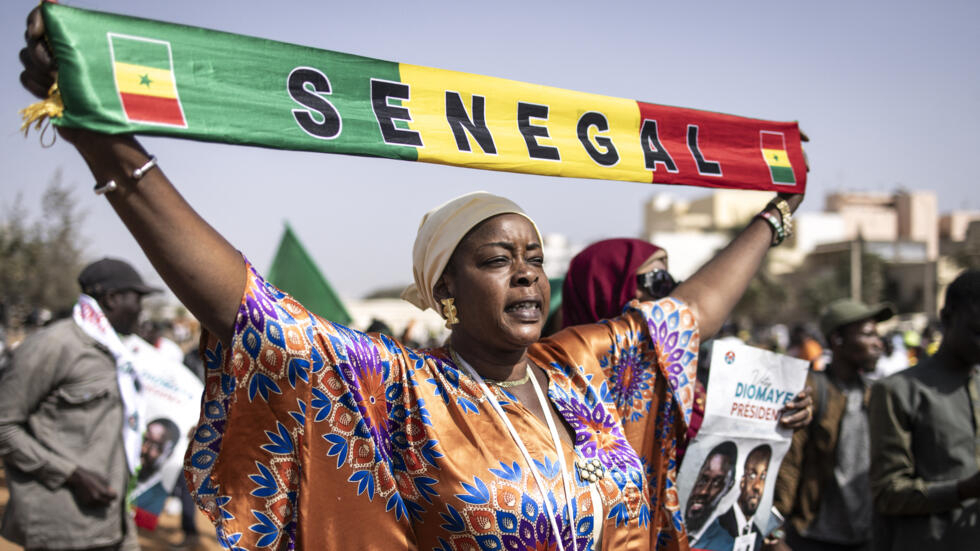
Over the past week, there were many important stories from around the African continent, and we served you some of the most topical ones.
Here is a rundown of the backstories to some of the biggest news stories in Africa that we covered during the week:
Egypt: In defence of bread subsidy
According to Mohamed Mait, Egypt’s finance minister, the nation’s budget for 2024–2025 will allocate $2.66 billion for wheat subsidies and $3.13 billion for petroleum product subsidies. A total of $12.67 billion was set aside for social protection measures, with 134 billion Egyptian pounds going specifically towards food subsidies.
The largest food crisis to hit Africa in forty years is currently affecting communities in Kenya, Nigeria, Ethiopia, and Somalia, among other places. Conflict is the main cause of Africa’s food crisis, as evidenced by the fact that 82% of the record 149 million Africans experiencing acute food insecurity live in conflict-affected nations but Egypt’s case is quite different.
Egypt is a significant importer of wheat, other staple goods, and petroleum into the world market and one of the most affected by poor grain supply in the aftermath of the Russian/Ukraine war. The country is currently dealing with foreign exchange shortages, a gaping budget, and balance of payments imbalances. About 60 million of Egypt’s 105 million inhabitants benefit from the nation’s subsidy program, which provides discounted prices on items like sugar, rice, and bread.
But its disposition towards subsidies is antithetical to the stance of multilateral bodies, the World Bank the International Monetary Fund (IMF) and other international bodies which are its main aid sources as it anticipates receiving more than $20 billion from the agreement mediated by the IMF. The country has moved from the verge of economic collapse to receiving over $40 billion from the UAE, IMF and likely investments from Saudi Arabia in just days in March.
In a 2023 assessment, the IMF contended that the wealthy benefited mostly from these subsidies because they consume the most. In the case of subsidies on energy, higher-income groups primarily profit from energy subsidies and the connection to the power grid is heavily biased toward higher-income people, and electricity subsidies are especially regressive. However, the impoverished would also suffer if they were eliminated. Even though there are notable differences in the types of energy products consumed across income groups, the poor would still experience a significant welfare impact from the elimination of subsidies.
Ongoing development in the Middle East, particularly the Israel and Hamas war as the boundary between Egypt and Israel stretches 206 kilometres (128 miles) along the eastern edge of the Sinai Peninsula from the de facto tripoint with Palestine (Gaza) to the Gulf of Aqaba in the Red Sea makes Egypt a geopolitical interest for the Western powers and its institutions who are tilted towards Israel in the conflict means the aids might not cease despite subsidies. The world cannot afford a broken Egypt at this critical time; cheap bread might just be the key.
Senegal Decides: The end of CFA Franc?
As Senegalese vote for their next president on Sunday, campaign promises of controversial opposition leader, Ousmane Sonko to consider the implementation of reform of the West Africa region’s CFA franc currency at a regional level first, and if that failed, would consider creating a national currency, if his preferred candidate, Bassirou Diomaye Faye, wins the next presidential election.
“We will try to implement a monetary reform at the sub-regional level first,” Sonko said. “If that fails, we will decide as a nation.”
“There’s no sovereignty if there is no monetary sovereignty,” said Faye, speaking at the same press conference.
Sonko claimed that the CFA franc, which is pegged to the euro and is used by eight members of the West African Monetary Union, has an impact on regional economic progress and that it is time to look into other choices.
The CFA stands for the African Financial Community or Communauté Financière Africaine representing two currencies the West African and Central African backed by the French government and have a fixed exchange rate to the euro which are although distinct, practically equivalent. Fourteen countries utilize the CFA franc, 12 of which were formerly French colonies. The French colonies used to use currencies pegged to the French franc, but a number of them departed the franc zone after gaining independence: Tunisia in 1958, Morocco in 1960, Guinea in 1959, Algeria in 1964, Madagascar, and Mauritania in 1973.
Given the level of autonomy attained by many former African French colonies since their independence, particularly in West Africa, critics of persisting neocolonialism object to the monetary situation. With an anti-France wave growing in the sub-region, the spread of military coups and ideological shifts towards Russia and China which are both global rivals to France’s African dominance, and the election launching a new president for Senegal, the jury is out on what would be the diplomatic leanings of the country as incumbent Macky Sall bows out.
South Africa’s ruling ACN struggles
During the week, South Africa’s ruling party, the African National Congress (ANC) threatened legal proceedings against a rival political party, uMkhonto weSizwe (Spear of the Nation) headed by a former president, and ANC chieftain, Jacob Zuma, manifesting a new level of cracks between the party. The party has a bad reputation due to months of unrest between former President Jacob Zuma and current President Cyril Ramaphosa.
In January, the ANC accused Zuma of insubordination and suspended him over what it described as “exceptional circumstances”. Zuma had criticized the ANC leadership in December and said that he would support the newly established uMkhonto Wesizwe (MK) party, which was named for the ANC’s former military wing, which had opposed apartheid but had disbanded when South Africa gained independence. Later on, Zuma declared that he would continue to be an ANC member.
The move seemed to irritate the ANC, whose popularity has been dwindling in recent elections due to high rates of poverty and unemployment in one of the most economically unequal nations in the world. The recent instability around the energy sector has forced the rationing of electricity for over a year and has also become a political point as the country builds up towards its next presidential elections in May.
There is a long history of internal conflict and dissension within the ANC, the first episode being in the 1930s as a result of the conservatives’ win in the late 1920s, which caused the leaders of the party to divide over whether or not to cooperate with the Communist Party. In recent history, however, following Thabo Mbeki’s constitutional ban from serving a third term as president of South Africa, there were indications of dissatisfaction within the party before the 2007 national conference. Had Mbeki been able to secure a third term as party president, he would have had significant influence over the selection of the nation’s next president in 2009 which was strongly challenged by sacked Vice president at the time, Jacob Zuma.
Fresh elections are in view again and the ACN’s turbulent history has repeated itself, with opposition voices like the radical Economic Freedom Fighters (EFF), and a parliament divided across eighteen political parties, the May 29 election might prove to be the biggest test yet for Nelson Mandela’s former party which has ruled South Africa since the end of white minority rule thirty years ago. With Zuma’s political base out of the equation for the ANC, a coalition which the party has also ruled out might be required to remain in power.
Niger: US efforts to regain lost ground in Africa suffers setback
The week began with the Niger Republic, one of the West African countries burdened with terrorist operations in the Sahel, announcing an end to military ties with the United States, dealing a blow to Washington’s recent push for a renewed global influence in Africa.
A surge of terrorism has hit the West African subregion, killing hundreds of people, destroying both private and public property, and uprooting millions of people. States and international organizations both inside and outside the sub-region have created and implemented various mechanisms to deal with the problem in response.
Over a thousand US forces are reportedly stationed in Niger, according to the US military. Furthermore, the US has a drone station in the country’s north, which is crucial for monitoring extremist groups in the Sahel region of Africa, which is located just beneath the Sahara desert.
The event draws attention to the US’s recent efforts to rebuild its alliance in Africa. Niger serves as the centre of US activities in West and North Africa, especially at Air Base 201, one of the most expensive construction projects the US government has ever carried out abroad. Despite its stated purpose of aiding counterterrorism efforts, the project is largely seen as a geopolitical posture against US global rivals China and Russia, both of whom African nations have recently leaned toward for military and economic ties.
International and regional sanctions have been imposed on Niger as a result of a coup that resulted in the removal of President Mohamed Bazoum. The US effectively stopped supporting Niger militarily, and the base’s activities were limited to observation to keep an eye on US soldiers.
You may like
-


S’Africa lengthens troop deployment in Mozambique, Congo DR
-
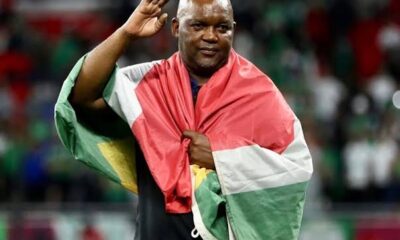

Domestic worker sues Pitso Mosimane, wife following debilitating injuries
-


Egypt reclaims 3,400-year-old stolen statue of King Ramses II
-
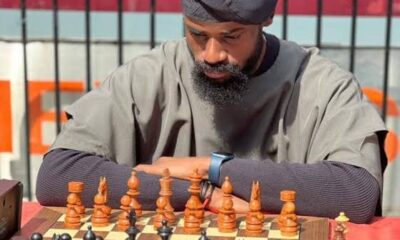

Behind the News: All the backstories to our major news this week
-


US to withdraw military personnel from Niger— Source
-
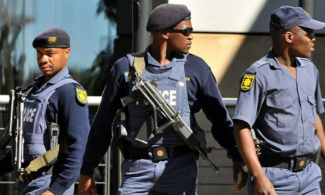

South African police arrest 8 Nigerians following attacks on officers
Behind the News
Behind the News: All the backstories to our major news this week
Published
5 days agoon
April 22, 2024
Over the past week, there were many important stories from around the African continent, and we served you some of the most topical ones. Here is a rundown of the backstories to some of the biggest news stories in Africa that we covered during the week:
Nigeria’s big feat against meningitis
Nigeria made a significant step in its fight against the World Health Organization (WHO) announced on Monday that Nigeria is the first country in the world to give out Men5CV, a “revolutionary” new vaccine. People are getting sick more in Nigeria than anywhere else in Africa. They say that the number of cases each year went up by 50% in 26 African countries that are known to have a high risk of meningitis.
Nigeria is the first country in the world to have given this vaccine which protects against five strains of the meningococcus bacteria. The Vaccine Alliance (Gavi) pays for the vaccine and emergency vaccination operations.
In Nigeria, between October 1, 2023, and March 11, 2024, there was an outbreak of Neisseria meningitidis (meningococcus) serogroup C that caused 1742 suspected cases of meningitis, 101 confirmed cases, and 153 deaths in seven of the country’s 36 states. These states were Adamawa, Bauchi, Gombe, Jigawa, Katsina, Yobe, and Zamfara.
Gavi also pays for the global meningitis vaccine stockpile and helps low-income countries get regular meningitis shots. Nigeria is one of 26 countries in Africa where meningitis is very common. It is in an area called the African Meningitis Belt. The number of meningitis cases reported each year in Africa rose by 50% last year.
Being a serious infection, meningitis makes the membranes (meninges) that cover the neurons in the brain and spinal cord swell up. Viral, bacterial, fungal, and parasite pathogens are some of the things that can cause meningitis. Headaches, fevers, and stiff neck are common signs. Bacterial meningitis is the worst kind. It can also lead to septicemia, which is blood poisoning, and people who get it can become severely disabled or die within 24 hours.
Besides Nigeria’s meningitis vaccine campaign, the international summit on meningitis in Paris will be a big step toward ending the disease as leaders will meet to celebrate progress, discuss problems, and decide what to do next.
Britain /Rwanda migration deal remains stuck
Rishi Sunak’s plans to send asylum seekers to Rwanda took another defeat this week when they were turned down again by the upper house of parliament in Britain. The parliament came up with changes that would slow down the policy but not stop it. The leader of the country thinks this will help his party win the next election.
Last year, the British government said it was going to send thousands of refugees back to the East African country. This was done to stop people from trying to get protection by crossing the English Channel in small boats from France. Part of an agreement worth £148 million is the idea.
Despite a Supreme Court’s ruling against the controversial move, Sunak has pushed to enact the law through parliament, praying that British courts should consider Rwanda a safe place to visit and that people should only be able to appeal in very rare situations. Europeans have become worried about people coming in illegally from the Middle East and Africa these days. As of June 2023, a record 45,000 people had flown in small boats across the English Channel.
Since Monday, when the House of Commons turned down the House of Lords’ second set of plans to change the new laws, they tried again. The House of Lords is Britain’s appointed upper house. But it’s not likely that the move will stop the bill from being passed this week. If it does, it will become law.
Ahead of the elections later this year, Sunak has put a lot of political capital into the Rwanda plan. He says it will help him keep his word to stop small boats carrying thousands of people who are trying to get into Britain illegally.
About 14.4% of the UK’s population, or 9.5 million people, were born outside of the UK in 2021. A record 45,000 people, mostly from France, crossed the English Channel in small boats last year. More than 11,000 people have been here so far this year. Getting rid of illegal immigration is one of Prime Minister Rishi Sunak’s top objectives.
Burkina Faso takes further steps from France
West African country, Burkina Faso has continued its diplomatic stance against former colonialist, France as it expelled three French diplomats allegedly being involved in actions against the government. The West African country, under military rule like five others in the subregion in a letter sent April 16 to the French embassy said that the three diplomats, two of whom were named as political advisers, were told they were not welcome in the country and had 48 hours to leave.
Sources quoted by Reuters said the officials were kicked out because they met with people from the public. There have been five coups in the area in the last three years. Most of them were linked to ties with France. The latest coup in Niger could make things harder for food markets in Nigeria and other West African countries, the World Bank said not long ago.
Around the world, rights groups, and other interest bodies claim that the junta restricts the freedom of speech and is scaring off critics while it tries to deal with a security crisis caused by rebels with ties to Iran and Al-Qaeda.
Last year, the government announced that it had suspended the 2018 military accord with France, though it still wanted support in the form of equipment. France deploys about 400 special forces soldiers in Burkina Faso, which the military government rules, but relations have deteriorated and tensions have soared in recent months.
Burkina Faso is one of the poorest in the world, and over the past ten years, a war that started in Mali and spread across the Sahel has killed thousands of people. People in the country are more against France now than they were a few months ago because they think that France’s armed presence has not made things safer, expelling its diplomatic might just be another low in their relations as the wave against the former European colonialists continues across the subregion.
Nigeria: ‘World beater’ Onakoya sets new chess record
Nigerian chess prodigy, Tunda Onakoya began an attempt at a 58 hours play of the game to surpass the world record of 56 hours, nine minutes, and 37 seconds, which was set by the Norwegian duo of Hallvard Haug Flatebø and Sjur Ferkingstad in 2018. Onakoya has broken the record set in 2018 by 56 hours. He also wants to raise $1 million for his charity, “Gift of Chess and Chess in Slums Africa,” which he has used to help vulnerable children in Africa.
For 60 hours straight, Onakoya played in Times Square in New York City to raise money for the schooling of poor children in Africa as he played from Wednesday morning until early Saturday morning, having been inspired by the huge number of people who wanted to see him succeed.
Within Nigeria, Onakoya is well known for starting the Chess in Slums project in 2018 in Ikorodu, which is on the outskirts of Lagos. Often outcast young people, many of whom don’t go to school and work to support their families, can learn to play chess at the organization with the country having one of the highest rates of child absence from school in the world, with more than 10 million kids of school age not going to school.
The Guinness Book of World Records has not yet confirmed the new record. This process can take up to two weeks. Whatever the case, Onakoya’s accomplishment has already had a big effect, showing that even from “corners of disadvantage,” big changes are possible.
Behind the News
Behind the News: All the backstories to our major news this week
Published
2 weeks agoon
April 14, 2024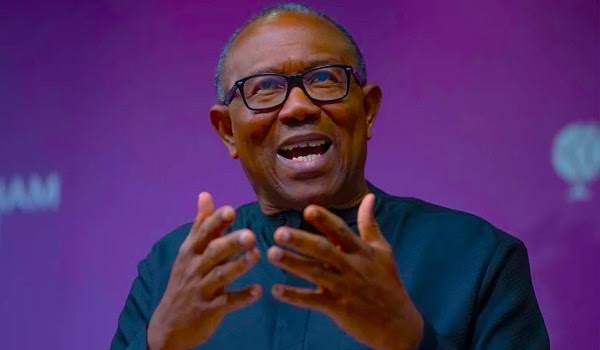
Over the past week, there were lots of important stories from around the African continent, and we served you some of the most topical ones.
Here is a rundown of the backstories to some of the biggest news in Africa that we covered during the week:
1. Nigeria, so rich, yet so poor: The sad tale of Africa’s sleeping giant
A few years ago, Nigeria was regarded as the giant of Africa in terms of the wealth deposits in the country and the potentials of becoming one of the richest countries in the world.
Apart from its vast human and capital resources, statistics have also revealed that Nigeria has well over 300 mineral resources deposited in every part of the country that could make the most populous black nation in the world one that others will look up to.
Many Nigerians have, over the years lamented the plundering of the Nigerian economy by successive administrations and thieving politicians who loot the country’s wealth and leave the nation in a very dire situation.
The latest to add his voice to the situation is the presidential candidate of the Labour Party (LP) in Nigeria’s 2013 general elections, Peter Obi, who, during the week, lamented the dwindling economy, hardship and poverty that Nigerians have been made to wallow in, especially since the coming of President Bola Tinubu on May 29, 2023.
The current administration has inadvertently plunged the nation into unbearable economic crisis with a majority of the masses finding it difficult to make ends meet.
Obi who expressed his disappointment at what the country is going through, emphasized that Nigeria
has no reason to be poor due to rich natural resources Nigeria is blessed with in every part of the country.
Obi made the assertion during a courtesy visit to the Emir of Zazzau, Ambassador Nuhu Bamali, at his palace in Kaduna State, northern Nigeria, bemoaned what he described as a waste of the vast arable lands in the country, especially in the North.
“Nigeria has nothing to do with poverty if those of us who are political leaders including my humble self had decided to serve the country faithfully,” the former Anambra State governor said while addressing the gathering.
“God created us with a lot of resources, and if those resources are properly put in place, we will pull most poor people out of poverty.
“The way things are in our country today requires that all of us must get involved in one way or the other.
“Because if we do, Nigeria will not have anything to do with poverty. I will always say this anytime I have the opportunity because Nigeria is one of the countries in the world that is blessed with everything that is required.
“The current socioeconomic instability in the country requires that all citizens and leaders come together and see how the situation could be salvaged,” he stressed.
2. ‘Never again!’ as Rwanda commemorates genocide’s 30th anniversary
Sunday, April 7, was a day of sober reflection for the eastern African nation of Rwanda as it marked the 30th years the devastating genocide that claimed more than 800,000 people, largely from the Tutsi ethnic group and moderate Hutus, in what has been described as one of the bloodiest massacres of the 20th century.
The killing spree in the tiny country lasted 100 days from April to July 1994 before the Rwandan Patriotic Front (RPF) rebel militia led by incumbent President Paul Kagame took the capital Kigali.
The genocide victims were shot, beaten or hacked to death in killings fuelled by vicious anti-Tutsi propaganda broadcast on TV and radio, with at least 250,000 women raped and sexually assaulted, according to UN figures.
But before then, the country had witnessed one of the worst cases of intra-nation violence which was was triggered by the assassination of Hutu President Juvenal Habyarimana on the night of April 6, when his plane was shot down over Kigali, which triggered the rampage by the Hutu extremists led military and the Interahamwe militia made up largely of Hutus.
However, the 30th anniversary of the genocide which was celebrated with solemn tributes to the victims, also saw a collective resolve that never again will the country experience such a devastating episode.
Since coming into power, Kagame has done everything to keep the country together and take away the memory of the genocide and aid its healing process.
Part of the measures instituted by the Kagame administration include no mention of ethnic groups on Rwandan ID cards, while secondary school students learn about the genocide as part of a tightly controlled curriculum.
Today, Rwanda had found its footing and has become one of the fastest developing countries in Africa with the western world falling over itself to do business with the country.
Since the end of the genocide and the assumption of office by Kagame, the president has pulled a tight string and every year, he keeps emphasising that there would never be a repeat of the sad incident that took the country to the brink.
3. One week, one trouble for Hichilema as alliance in popularity challenge
The outgone week saw another testament of Zambian President Hakainde Hichilema’s one week, one trouble after the coalition, the United Kwacha Alliance (UKA), challenged to test his popularity by conducting early presidential elections.
The coalition threw the challenge to Hichilema after the police declined its request to organise a public rally citing security concerns.
In a response, the alliance which believed they were denied what is constitutionally their fundamental rights, said if Hichilema thought he was popular with the masses, he should test such popularity by calling for an early election.
Reacting to the denial, the coalition, in a statement by its Chairman, Sakwiba Sikota, said it was not surprised at the response of the Zambian Police force which is controlled by the ruling UPND.
The alliance however, said it would not relent in its task of liberating the Zambian people from this repressive UPND regime.
The UKA also accused President Hichilema and the UPND of violating the rights of Zambians who don’t support their ineffective and short-lived government.
This new faceoff is one among a series of attacks and accusation levelled at Hichilema by opposition figures over his running of the government.
The Zambian President has come in for severe criticism with his style of leadership which is typical of the kind of politics being played by most African leaders who, more often than not, tend to change once they get into office.
Hichilema on his part, has not acted differently as he has also shown that his government is not different from what is obtained in most African nations.
while assuring that the UPND government could not stop the people’s movement.
4. Nigeria’s northern elders group pass vote of no confidence on President Tinubu
The current situation in Nigeria where the masses are reeling in unbearable hardship and poverty and a result of the policies of President Bola Tinubu, has forced a group of elders from the Northern region to pass a vote of no confidence in him.
The group of eminent political leaders and leaders of thought under the aegies of the Northern Elders Forum during the week, said it regretted campaigning for Tinubu and getting the people of the region to vote for him in the 2023 presidential election.
The Elders Forum, in a statement, said they deeply regret voting for Tinubu and vowed not to repeat mistake in 2027 which is the next general election cycle.
The eminent group of elders, in the statement issued by its spokesman, Abdul-Azeez Suleiman, said it is disappointment with the Tinubu administration, and would prioritize unity and consensus in selecting a candidate for the highest office in the land.
“The North made a mistake in voting Bola Tinubu to the presidency in 2023, and it is unlikely that they will repeat the same error in the future,” the Forum said.
“The North have learned from their past misstep and will strive to select a candidate who can unite the country and govern in the best interests of all Nigerians.
“Moving forward, the North will be more cautious in selecting a candidate for the presidency. They will prioritize someone who is seen as more inclusive, less controversial, and more aligned with the interests of all regions of the country.
“The mistake of supporting Tinubu in 2023 has taught them the importance of unity and consensus in selecting a candidate for the highest office in the land,” Suleiman reiterated.
The import of the threat by the Northern eldets is another clear sign of the disenchantment ordinary Nigerians have felt for President Tinubu despite his constant assurances that all his policies are meant to revamp the country’s economy and make life better for the people.
A vote of no confidence coming from elders of a region that accounts for the highest number of votes in Nigeria would definitely spell doom for the President in the next election and only a change of fortunes in the lives of the people can buck a change.
5. 10 years of schoolgirls’ abduction: Still no end in sight
Ten years ago, when the dreaded Boko Haram insurgents struck the Government Girls’ Secondary School in Chibok in Borno State and abducted 276 female students all in their early teens, many Nigerians did not believe that till now many of the girls will still be in captivity.
The government of then President Goodluck Jonathan promised to rescue the girls but a year later when it left power, they could not rescue all the girls.
Then came the regime of President Muhammadu Buhari and another round of promises rented the air. With his background as an accomplished Army General, it was a given that in no time, the girls would be rescued and reunited with their families.
But 10 years have gone by and about 89 of the victims are still missing. Many of them have been rescued, some have managed to escape while reports indicate that many of them have been married off to the terrorists and have become mothers.
And as Nigeria marks the 10th year commemoration of the abduction of the schoolgirls, there is no end in sight yet for the release of about 89 of the girls still remaining in captivity.
On this 10th year commemoration of their being in captivity, Nigerians are looking forward to the day the remaining girls, especially the poster girl of the abductees, Leah Sharibu, will be free and join up with their families and loved ones.
EDITOR’S PICK


Intel Liftoff Hackathon 2024 calls for applications from African AI startups
Applications for the 2024 cohort of Intel Liftoff Hackathon has opened for African AI startups designed to bring together aspiring...


African men run away from single mothers— Joselyn Dumas
Veteran Ghanaian actress and media personality, Joselyn Dumas, has lamented the fact that most African men shy away from getting...


Former Zambian captain Rainford Kalaba discharged from hospital after near-fatal accident
Former Zambian national team captain, Rainford Kalaba, has been discharged from hospital weeks after he was involved in a near-fatal...


‘Cyber Act fails to protect the vulnerable,’ Student demands media inclusivity for persons with disabilities
Peter Libila, a student at Icof University’s Chipata campus, highlights the lack of awareness among individuals with disabilities and those...


All my tough policy decisions are in Nigerians’ interest— Tinubu
President Bola Tinubu of Nigeria has insisted that all his tough policy decisions and reforms have been taken with the...
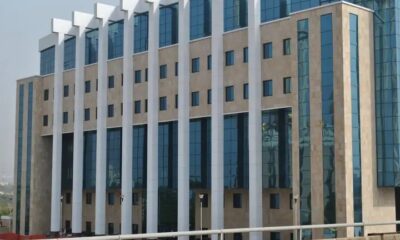

Nigerian oil regulator implements regional fuel standards
Nigeria’s oil authority has clarified that the recent changes to diesel fuel sulphur content standards are part of a regional...


IMF predicts Kenya’s economy to overtake Angola
The International Monetary Fund (IMF) says that this year, Kenya will pass Angola to become the fourth biggest economy in...


S’Africa lengthens troop deployment in Mozambique, Congo DR
President Cyril Ramaphosa said in a speech that South Africa’s military would keep sending troops to Mozambique and the Democratic...


Nigeria govt cancels 924 dormant mining licences
Nigeria’s minister of mines said on Wednesday that 924 expired mining licences had been cancelled immediately. The country now wants...


Nigeria’s NGX Group enters into strategic investment partnership with Ethiopian Securities Exchange
Leading Nigerian integrated market infrastructure group in Africa, the Nigerian Exchange Group (NGX), has announced strategic investment in the Ethiopian...
Trending
-

 Culture1 day ago
Culture1 day agoNamibia govt condemns tourists posing naked on Big Daddy Dune
-

 Tech1 day ago
Tech1 day agoNigeria’s NGX Group enters into strategic investment partnership with Ethiopian Securities Exchange
-

 Metro16 hours ago
Metro16 hours ago‘Cyber Act fails to protect the vulnerable,’ Student demands media inclusivity for persons with disabilities
-

 Sports15 hours ago
Sports15 hours agoFormer Zambian captain Rainford Kalaba discharged from hospital after near-fatal accident


